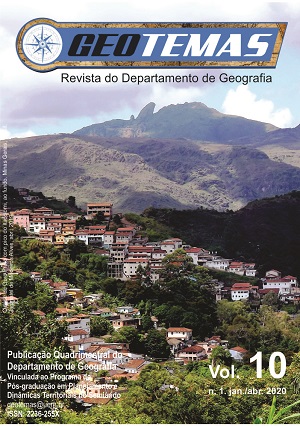The presence of geographic knowledge in the anciente and middle ages
Keywords:
Geographical Knowledge, Old Age, Middle AgesAbstract
The work in focus, comprises a study that aims to show that geographic knowledge was already present in the ancient and middle ages and that the geographical ideas produced in that period were of great importance for the formation of modern academic Geography. In that context, the research developed used the deductive method as a starting point and, it is a qualitative study, since it is a bibliographic research about the highlighted theme, as a way of starting from the reading of the bibliographic collection, to obtain valid information regarding the presence of geographic knowledge in the ancient and middle ages. Given the study, it is concluded that scientific Geography as we know it today, is the result of a long process of origin and systematization of geographic knowledge, whose genesis goes back to the Ancient Age and extends to its systematization as science, in the 19th century. Geographic ideas over the centuries, from the ancient age through the middle ages, arose not by chance, but from the need for human beings to orient themselves and to be located in the space in which they lived, to represent it through maps and to better understand the nature and the universe.
Downloads
References
ANDRADE, M. C. de. Geografia, ciência da sociedade: uma introdução í análise do pensamento geográfico. São Paulo: Atlas, 1992.
ABRíO. B. S. et al. Enciclopédia do estudante: história da Filosofia: da antiguidade aos pensadores do século XXI. São Paulo: Moderna, 2008.
BAUAB, F. P. Idade Média e conhecimento geográfico. Revista Faz Ciência, Londrina v.9, n.9, jan./jul., 2007, p. 149-166. Disponível em: <http://e-revista.unioeste.br/index.php/fazciencia/article/view/7499/5540>. Acesso em: 02 dez. 2019.
CARVALHO, M. S. de. Geografia e utopias medievais. Semina: Ciências Sociais e Humanas. Londrina, v.15, n.3, set, 1994, p. 223-238.
CARVALHO, M. S. de. Geografia e Imaginário na Idade Média. In: RAE'GA (Boletim do Departamento de Geografia da Universidade Federal do Paraná). Ano 1. n.1. 1998, p. 4560. DOI: http://dx.doi.org/10.5380/raega.v1i0.17914
CLAVAL. P. Epistemologia da Geografia. Tradução de Margareth de Castro Afeche Pimenta e Joana Afeche Pimenta. 2. ed. Florianópolis: Ed. da UFSC, 2014.
CHAUI, M. Iniciação í Filosofia. Ensino Médio/volume único. São Paulo: ítica, 2012.
DIEHL, A. A.; TATIN, D. C. Pesquisa em ciências sociais aplicadas: métodos e técnicas. São Paulo: Prentice Hall, 2004.
GIL, A. C. Como elaborar projetos de pesquisa. 4. ed. São Paulo: Atlas, 2006.
GODOY, P. R. T. (org.). História do pensamento geográfico e epistemologia da Geografia. São Paulo: Cultura Acadêmica, 2010.
KIMBLE, G. H. T. A Geografia na Idade Média. Trad. Marcia Siqueira de Carvalho. Londrina: Editora da UEL, 2000.
MORAES, A. C. R. de. Geografia: pequena história crítica. 20. ed. São Paulo: Annablume, 2005.
MOREIRA, R. O que é Geografia? 2. ed. Brasília: Coletivo Território Livre, 2009.
NICOLA, U. Antologia ilustrada de Filosofia: das origens í Idade Moderna. São Paulo: Globo, 2005.
RUIZ, J. í. Metodologia científica: Guia para eficiência no estudo. 5. ed. São Paulo: Atlas, 2002.
Downloads
Published
How to Cite
Issue
Section
License
Authors who submit their manuscripts to Geotemas declare that the work is an original article and has not been submitted for publication, in full or in part, in another national or international scientific journal or in another circulation vehicle. The authors also declare that they agree with the transfer of the copyright of the referred article to the magazine Geotemas (University of the State of Rio Grande do Norte), allowing for later publications, as long as the source of its publication is assured. Finally, they assume public responsibility for the article, being aware that any charges arising from a claim by third parties regarding the authorship of the work may apply to them.





















